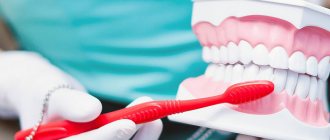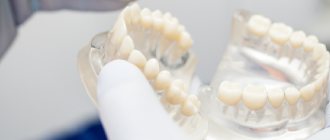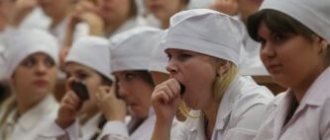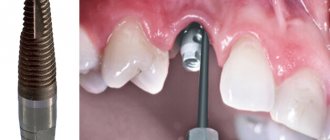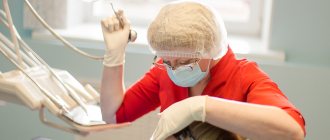Author: ProfGid
A dental technician is a specialist in the manufacture of dentures. By the way, in 2021, the ProfGid career guidance center developed an accurate career guidance test. He himself will tell you which professions are suitable for you, and give an opinion about your personality type and intelligence.
Features of the profession
Although the profession of dentist has existed since ancient times, the profession of dental technician emerged as an independent specialty relatively recently. A dental technician makes artificial dental crowns, various designs of bridges, removable plate and clasp dentures, orthodontic and maxillofacial structures, etc. The dental technician selects designs and materials together with the patient. He makes a cast of the jaw, and uses it to make a model of the future prosthesis and the prosthesis itself. Modern materials and technologies make it possible to produce prostheses that are indistinguishable from real teeth. And the technician’s task is to create a prosthesis that will replace the lost one not only functionally, but also aesthetically.
Each patient is unique, so it is impossible to streamline the production of dentures. A dental technician works in partnership with an orthopedic dentist, and the final result depends on the level of work of each of them.
In the work of a dental technician, reputation is very important both among clients and among professionals. And a talented master is always in great demand. Therefore, he can earn even more than a regular dentist.
In his work, a dental technician uses various equipment: a melting furnace, a wax furnace, a sandblasting machine, welding and spraying equipment, a vacuum pump, a casting unit, a grinding machine, etc.
What does a dental technician do and how much does he earn?
Reading time: 4 minute(s) Contrary to popular belief, the professions of dentist, dentist and dental technician are completely different specialties. And while the health of your teeth largely depends on the dentist and doctor, the dental technician is responsible for the beauty of your smile. In this regard, training to become a dental technician differs significantly from training to become other dental specialists.
Today we will talk about what this profession is and what its distinctive features are.
Who is a dental technician
A dental technician is an employee of a dental laboratory who specializes in the manufacture of dentures, implants, maxillofacial and orthodontic appliances.
Is it difficult to study?
To become a dental technician, you must graduate from a secondary specialized educational institution.
There are two options for studying at a school or college: if you enter a secondary school after finishing 11 grades, the training will take 2 years and 10 months, and after 9 grades – almost 4 years.
It is important to understand that the profession of a dental technician involves constant learning and gaining new knowledge throughout your career. The higher the professional level of a specialist, the more in demand he is and the higher his work is valued.
If desired, holders of a higher medical education can also obtain the profession of a dental technician. To do this, they only need to undergo a retraining course for specialists.
Pros and cons of the profession
Like any other specialty, the profession of a dental technician has a number of undeniable advantages, including the two most significant:
- demand in the labor market;
- high level of remuneration.
At the same time, working as a dental technician is not without its disadvantages: sedentary work and constant contact with chemicals are significant disadvantages of this profession.
Requirements and Responsibilities
Due to the nature of the specialization, a professional dental technician must have the following personal qualities:
- composure;
- accuracy;
- perseverance;
- patience;
- observation;
- attentiveness;
- neatness;
- sense of color;
- spatial thinking;
- artistic taste;
- goodwill.
A good memory and excellent eye are the advantages of this specialist.
A professional dental technician must understand and have extensive knowledge of:
- physics;
- chemistry;
- anatomy;
- mathematics;
- materials science;
- metalworking, engraving and milling.
In addition, the specialist must have the skills of a welder, foundry worker, electroplating chemist, and skills in working with computer programs for designing three-dimensional models of prosthetic frames.
The job responsibilities of a dental technician can be divided into two categories:
- basic: production of artificial crowns, orthodontic structures and maxillofacial devices, including: creating a sketch;
- preparation of a design layout;
- selection of materials for the prosthesis;
- creation of a preliminary model;
- design adjustment.
- compliance with technologies and production deadlines;
Work and salary
If you have the appropriate education, a dental technician can apply for work in:
- state dental clinic;
- private dental clinic;
- hospital;
- specialized dental laboratory.
The salary of this specialist greatly depends on his professionalism, experience and the number of orders. For example, immediately after graduating from a secondary school, dental technicians go to work in state clinics, where they receive an average salary (about 20 thousand rubles for Moscow). After developing certain skills and professionalism, a specialist can count on a salary of up to 200 thousand rubles.
Thus, the average salary of dental technicians in the capital ranges from 50 to 120 thousand rubles.
How to become a dental technician?
What does it take to work as a dental technician?
In order to obtain the profession of a dental technician, it is necessary, first of all, to undergo training at a secondary specialized educational institution in the profile “Orthopedic Dentistry”
After graduating from secondary educational institutions, many graduates go to work as assigned to state clinics, thus gaining such valuable experience in this profession.
Subsequently, a specialist can count on working in a private institution, but throughout his career he needs to undergo additional training, confirming his professional suitability and improving his own qualifications.
How to get a certificate?
A dental technician certificate is a document confirming the completion of specialized courses and the professionalism of a specialist.
To obtain this certificate, you must complete advanced training courses. According to established rules, medical workers must confirm their professional suitability every five years.
You can take an advanced training course in “Orthopedic Dentistry” at any accredited educational institution:
- University;
- SSUZ;
- dental clinic;
The training program at such institutions includes not only a theoretical and practical course, but also a final exam, based on the results of which the qualification commission decides to issue/confirm a certificate.
Are there courses for dental technicians without medical education?
Is medical education necessary or are courses enough?
To become a dental technician, it is not necessary to have a higher medical education; it is enough to graduate from a secondary specialized educational institution with a degree in Orthopedic Dentistry.
Training to become a dental technician: where to study?
University
You can become a dental technician even after higher education. To do this, you need to graduate from a university with a degree in Dentistry and then take courses as a dental technician.
Future dental technicians can receive higher education in such institutions as:
- Moscow: Russian National Research Medical University named after N. I. Pirogov;
- Moscow State Medical and Dental University named after. A.I. Evdokimova;
- First Moscow State Medical University named after. I.M. Sechenov;
- Peoples' Friendship University of Russia;
- Moscow Medical University "REAVIZ".
- St. Petersburg Medical and Social Institute;
Colleges after 9th grade
One of the easiest ways to obtain the profession of a dental technician is to obtain secondary specialized education in the field of “Orthopedic Dentistry”, which can be entered both after the 11th and after the 9th grade.
Such institutions in Moscow are:
- Moscow State Medical and Dental University named after. A.I. Evdokimova;
- Medical College No. 5;
- First Moscow State Medical University named after. I.M. Sechenov;
- Medical College of the Moscow State Transport University of Emperor Nicholas II;
- Moscow Regional Medical College No. 1.
In St. Petersburg, this area is represented only at St. Petersburg Medical College No. 3.
Courses
You can take dental technician courses at such Moscow training centers as:
- Academic: duration: two to five days;
- tuition fee: from 6 to 52 thousand rubles.
- duration: from 8 to 36 hours;
- duration: from 3 hours to 5 days;
- tuition fee: 20 thousand rubles.
In St. Petersburg, the largest educational center training dental technicians is the “School of Dental Technicians”:
- duration: from 8 to 36 hours;
- tuition fee: from 1.5 to 32 thousand rubles.
At the same time, you can get training in such organizations as:
- exclusive representative of the Israeli LLC "Perflex RUS"
- dental laboratory "Dental Praktik";
- orthodontic laboratory "Schneider";
- educational
The average cost of dental technician courses in St. Petersburg is 10-20 thousand rubles.
Refresher courses
When choosing a refresher course for dental technicians, you need to pay attention to factors such as:
- status and reputation of the educational institution, availability of accreditation;
- Teaching Staff;
- issuance of state-issued supporting documents;
- training program;
- the ratio of theoretical and practical parts;
- the ability to obtain teaching materials online;
- duration of training;
- cost of education.
It is important to understand that the more responsible an educational institution is in training specialists, and the more prestigious it is, the higher the cost of courses.
Thus, the profession of a dental technician guarantees a specialist not only permanent employment and employment, but also, upon gaining certain experience, a high salary.
Did this article help you? We would be grateful for your rating:
84 10
Important qualities
A dental technician needs well-developed fine motor skills, accuracy, a penchant for manual labor, observation, high concentration, good working memory, physical and mental endurance. And also sensitivity, empathy, attentiveness to people, the ability to get along with patients. Contraindications: irritability, rudeness, chronic infectious and allergic diseases, cardiovascular diseases, mental illnesses and nervous system disorders, hearing, speech, vision disorders, hand skin diseases.
Studying to become a dental technician without medical education after 9th grade
So, we found out that studying to become a dental technician without obtaining a medical education is possible. Today, colleges offer training within the educational program of the state standard “Orthopedic Dentistry”. Today, not many educational institutions offer study in this area after 9th grade; at Intercollege, for example, you can also get an education only on the basis of 11th grade. But we have day and evening courses. Orthodontic technicians are in greater demand than ever, with a strong demand for both general specialists and professionals in certain specialties (for example, there is a shortage of qualified technicians with a high level of education and experience in the manufacture of bite straightening devices, as well as ceramic technicians in the market). working with prostheses and implants made of metal ceramics, specialists in removable clasp dentures and artificial jaws). To become a truly good specialist, you need to perfectly master techniques and technologies, as well as the basics of working with special tools: stamping machines, foundry equipment, tools for processing materials, and so on.
Disadvantages of being a dental technician
If we talk about the disadvantages of the dental technician profession , then, first of all, it is necessary to note the harmful working conditions.
- Firstly, when making dentures, a specialist has to work with chemicals harmful to his health, and in some cases, radioactive ones (in particular, the whiteness of artificial ceramic teeth is achieved by adding inclusions of uranium).
- Secondly, a dental technician spends almost all of his working time in a sitting position, which negatively affects the musculoskeletal system of the technician. Well, working with small parts causes excessive eye strain, which can cause deterioration in the specialist’s vision.
We cannot remain silent about the fact that in the process of his work, a dental technician needs to be extremely careful. And not only because the functionality and aesthetic appeal of prostheses depends on his work. Quite often, a specialist has to redo a failed prosthesis or implant at his own expense.
Remote learning after college
Distance learning after college implies a stage of advanced training for practicing specialists.
There is no need to visit the educational institution in person and take a workshop, since these courses include only theory:
- various changes in the work of health workers at the legislative level;
- familiarization with new technologies, equipment and materials;
- innovations in the manufacturing process of maxillofacial devices.
Most often, a medical institution sends an employee to undergo advanced training courses if there are special prerequisites for this (mass training of personnel, lack of necessary skills and experience on the part of the employee, the emergence of new equipment).
The employee’s level of professionalism determines his work status and salary level.
The main advantage of distance learning in this case is a flexible educational schedule, allowing a specialist to combine work and taking advanced training courses without any damage or inconvenience.
Dental colleges in Russia
There is only one dental college in St. Petersburg: you can get an education in this area at Medical College No. 3. There is a large supply of budget places and a high price for contract education: 150,000 rubles. There are no more dental colleges in St. Petersburg, but this specialty is taught in many St. Petersburg hospitals. universities
You can study to become a dental technician in college after 11th grade in many other cities of the Russian Federation.
- Medical College of Volgograd State Medical University.
- Rostov Basic Medical College.
- Medical and Pharmaceutical College of the Far Eastern State Medical University.
- Tyumen Medical College.
- Medical College of Saratov State Medical University named after V. I. Razumovsky
- Novosibirsk Medical College.
- Orenburg Regional Medical College.
- Kaluga Basic Medical College.
- Kirov Medical College.
- Vladimir Basic Medical College.
Studying in college to become a dentist can be difficult: you need to learn a lot of general and special disciplines and memorize a lot of information. You can make the learning process easier by enlisting the support of a student assistance service. Its experts will always give good advice, help you understand the material or prepare any academic work.
How to become a dentist: studying in college
Go to medical school University for the most popular specialty among applicants, “dentistry,” is not easy. Those who decide to start studying at college to become a dental technician after 11th grade have a better chance and after graduating can apply for the 2nd year of university.
Please note: you cannot go to dental college after the ninth grade; only graduates of the eleventh grade receive professional education in this profile.
Specialties of medical dental colleges
Dental technicians in colleges are trained in 2 areas:
- preventive dentistry;
- orthopedic dentistry.
The second educational program is more popular; it is presented in most medical colleges.
How to enter medical colleges to become a dental technician
To become a student at a dental college after 11th grade, you need to submit documents to the admissions committee (application, copy of passport, certificate of secondary education) and pass exams:
- Russian language;
- physics;
- chemistry.
In addition, the admissions committee conducts psychological testing for applicants to understand whether a person can not only study in college as a dental technician, but also work in his specialty.
Going to a good dental technician is not scary at all
Distance learning
Medical colleges offer various forms of education, among which the modern, most convenient way of distance education is available.
But it is worth noting that you can only study diagnostics and pharmacology completely remotely, since these areas of medicine, most often, do not require mastering the practical part. Training to become a dental technician involves studying both a large block of theory and the ability to apply it in practice. Therefore, a distance student is allowed to master only the theoretical block.
In the process of distance learning, the future dental technician, just like in other forms of education, takes various tests, writes tests and term papers, attends seminars and colloquiums, at which the teacher is obliged to check how well the student has mastered the material.
To pass the practical part, the student must personally visit the educational institution, complete the tasks necessary to master the profession, and learn to apply theory in practical activities. This is necessary for the quality of further work of the specialist.
Training to become a dental technician in Moscow at Intercollege
It’s a paradox, but training to become a dental technician in Moscow today is offered by hundreds of educational institutions, and the demand for such specialists is only growing every year. Studying in Moscow at Intercollege is an opportunity to become a really good specialist and gain practical work experience directly as part of the educational process. Our program consists of a serious theoretical course, which involves the study of such general professional disciplines as:
- Human anatomy and physiology with a course in biomechanics of the dental system;
- Dental materials science with a course in occupational health and safety;
- Fundamentals of microbiology and infectious safety;
- First aid;
- Dental diseases;
- Teeth modeling and more.
As part of the practical course, our students learn skills such as:
- Manufacturing of removable laminar dentures;
- Manufacturing of fixed dentures;
- Manufacturing of clasp dentures;
- Manufacturing of orthodontic appliances;
- Manufacturing of maxillofacial devices and more.
Our college cooperates with several clinics, so students have the opportunity to practice in real conditions and, as graduates, already have developed skills, so getting a job after graduating from college is not difficult. Full-time education to become a dental technician at Intercollege costs 55 thousand per semester, evening - 45 thousand.
You can find out more about entrance examinations at our college in the specialty “Orthopedic Dentistry” by calling our Admissions Committee

